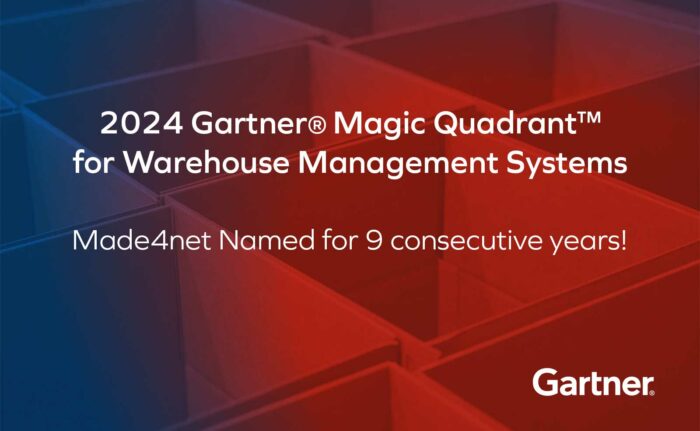Selecting the right Warehouse Management System (WMS) is a crucial decision for any business looking to optimize its warehouse operations. With a plethora of options available in the market, it can be a daunting task to find the WMS that best suits your unique needs. In this blog post, we will guide you through the process of paring down the pool of over 100 WMS software vendors and creating a shortlist of 5-7 WMS software solutions so you can make an informed choice that aligns with your business goals and requirements.
1. Rely on Research
One of the most valuable sources of guidance when choosing a WMS is Gartner’s Magic Quadrant for Warehouse Management Systems.
If you are looking for an evaluation of the WMS software market, this is the right report for you. Specifically, the report will enable you to:
- Get quickly educated about WMS providers and their ability to deliver on what end users require today and, in the future
- Understand how WMS providers are competitively positioned and the strategies they are using to compete for end-user business
- Compare a provider’s strengths and challenges with your organization’s specific needs
You can download a complimentary copy of the latest Gartner Report here.
2. Tap into Your Network
Your professional network includes individuals with diverse experiences and expertise. By tapping into this network, you can collect real-world feedback on your contacts’ experiences with specific WMS solutions. This feedback is invaluable because it comes from individuals or organizations who have first-hand experience using a system in similar operational contexts. References from your network can provide insights that are often more candid and unbiased than information provided by WMS vendors. This will allow you to gain a deeper understanding of the system’s strengths and weaknesses.
When you reach out to your contacts, you can inquire about aspects of the WMS that are particularly relevant to your business. This allows you to get personalized advice based on the specific needs and challenges you face in your industry or niche. Your contacts can also alert you to any potential pitfalls or challenges they encountered with a particular WMS. This insight can help you prepare for and mitigate issues that may arise during implementation or regular use.
3. Consider Your Competitors
Studying your competition when building a shortlist is crucial for several reasons. Businesses within your industry have likely faced similar challenges and requirements. By observing which WMS solutions others in your industry use, you can tap into their industry expertise and benefit from their experience in selecting a system that aligns with your specific needs. If your competitors are successfully using a particular WMS, it’s an indication that the system is suitable for businesses like yours. This validation can instill confidence in your choice and reduce the risk associated with implementation.
Your competitors may have already optimized their warehouse operations using their chosen WMS. By adopting similar solutions, you can benefit from the best practices they have developed in the process. Selecting a WMS that is common in your industry ensures you are on par with or ahead of your competitors in terms of technology, efficiency, and customer service. Finally, if multiple competitors are using the same WMS, vendors may be more familiar with the unique needs and challenges of your industry. This can lead to better support and more tailored solutions.
4. Read the Reviews
Several websites offer in-depth WMS reviews from real users, including Gartner Peer Insights, Capterra, and Software Advice. On these sites you can compare and filter data in order to discern the strengths and weaknesses of various solutions.
5. Finalizing Your Shortlist
Now that you’ve gathered initial insights, it’s time to create a shortlist of WMS solutions. Consider the following key information for each solution:
- Functionality: Does the WMS provide the specific functionality you need for your warehouse operations?
- Configurability: Is the solution configurable to adapt as your business changes?
- Licensing Costs: What are the costs associated with licensing the WMS?
- Deployment Costs: Consider the expenses related to implementing the WMS.
- Included Services: What services are included with the WMS package?
- Project Timeline: What is the expected timeline for implementing the WMS?
Based on your initial assessment, narrow down your list to the 5-7 WMS software solutions that seem most promising. Then begin reaching out to these selected vendors to gather more in-depth information, request demos, and discuss your specific requirements.
Conclusion
Selecting the right Warehouse Management System is a decision that can significantly impact your warehouse operations. By leveraging industry research, advice from industry peers, competitive data and user reviews, you can create a shortlist of 5-7 WMS solutions that are worth further exploration. Conduct thorough research and engage with vendors to ensure that your final choice aligns perfectly with your business needs and goals. Making an informed decision will help you optimize your warehouse operations and drive business growth.
Click here to request a meeting to learn more about Made4net’s industry leading warehouse management system, WarehouseExpert.
Once you’ve selected the best WMS for your business, be sure to check out our complete guide to WMS implementation for a successful deployment.



